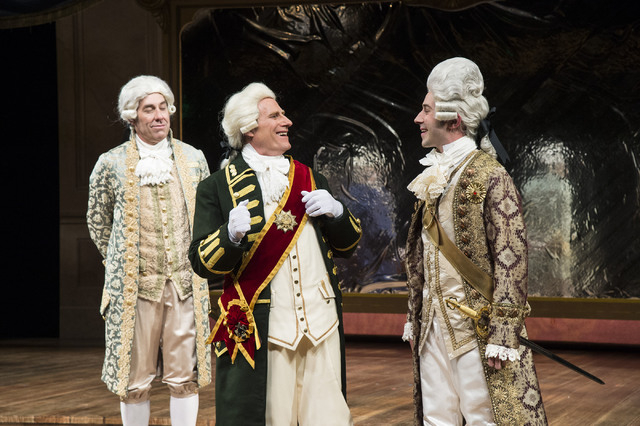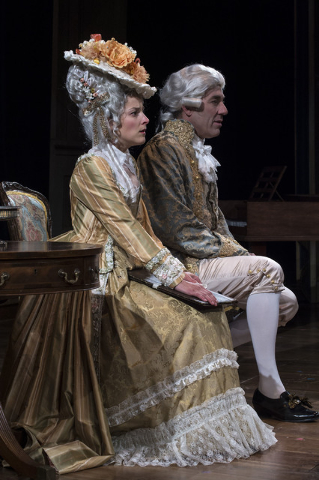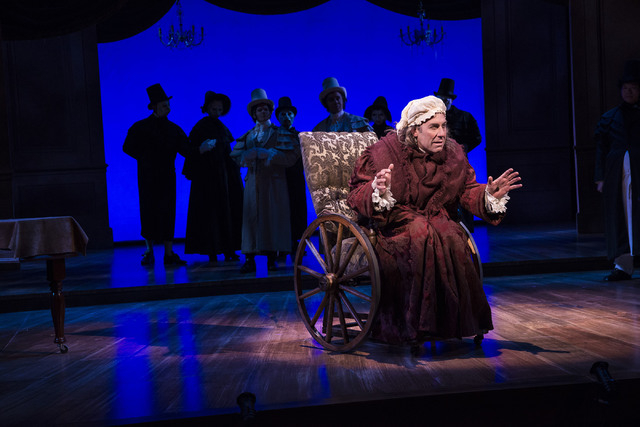‘Amadeus’ casts magic spell on stage
A pity William Shakespeare missed Antonio Salieri by a couple of centuries.
It’s tantalizing to imagine what the Bard himself might have done with such a fascinating character. But considering what playwright Peter Shaffer achieves in “Amadeus,” we’re not missing much.
The Utah Shakespeare Festival’s current production of “Amadeus” doesn’t miss much either.
You’ve already seen the movie, you say? As wonderful as that Oscar-winning adaptation is, it still doesn’t cast the spell the stage original does.
Partly, it’s the intimacy of the theater. And partly, it’s the way protagonist Salieri draws us in, confesses to us, makes us share his torment — and makes us witnesses, even accessories, to his crimes.
In that sense, Salieri very much resembles some of Shakespeare’s most hypnotic villains. (Think Iago — or Richard III.) Their wickedness may shock and horrify us, but it doesn’t surprise us — because they’ve explained it all to us. The same holds true for Salieri (played with haunting intensity by David Ivers, USF’s co-artistic director), composer at the Viennese court of Austro-Hungarian Emperor Joseph II (a genially oblivious John Pribyl).
Salieri prides himself on his piety, his rectitude, his reverence for God. He may not be a musical genius, but he knows one when he hears one.
And when he hears the music of former wunderkind Wolfgang Amadeus Mozart (a manic yet mournful Tasso Feldman), Salieri’s astonished — and appalled — to realize that such divinely inspired music comes from such a heedless hedonist.
Mozart giggles, he spouts baby-talk profanity, he chases his beloved Constanze (Betsy Mugavero, deceptively blithe) around the room and under the piano, making cheerfully suggestive suggestions.
Nobody else may recognize the genius of this “Creature,” as Salieri dubs him. But Salieri does. And that’s enough to push Salieri toward a vow of vengeance — against Mozart and, especially, against God — that threatens to destroy them both.
Such a symbiotic conflict seems worthy of grand opera — and, indeed, that’s how director J.R. Sullivan approaches this “Amadeus,” maximizing the play’s inherent theatricality.
The opening moments — when Viennese gossips (led by UNLV alumnus Brandon Burk, former artistic director of Las Vegas’ Onyx Theatre) whisper the rumor that Salieri had something to do with Mozart’s mysterious death at 35 — conjure a compellingly heightened reality, full of shadows and portents.
It’s a world that draws us in, envelops us, holds us spellbound as we watch Salieri struggle with his demons. Ivers makes that struggle thrillingly clear, contrasting Salieri’s florid, self-righteous speechifying with subtly anguished body language that betrays what his character knows all too well: there’s no possible justification for what he’s done, but what’s done can’t be undone.
Yet we understand. Salieri’s only human — and so, after all, are we.
— CAROL CLING
REVIEW
What: "Amadeus"
When: In repertory through Sept. 5
Where: Utah Shakespeare Festival, Cedar City
Grade: A
























